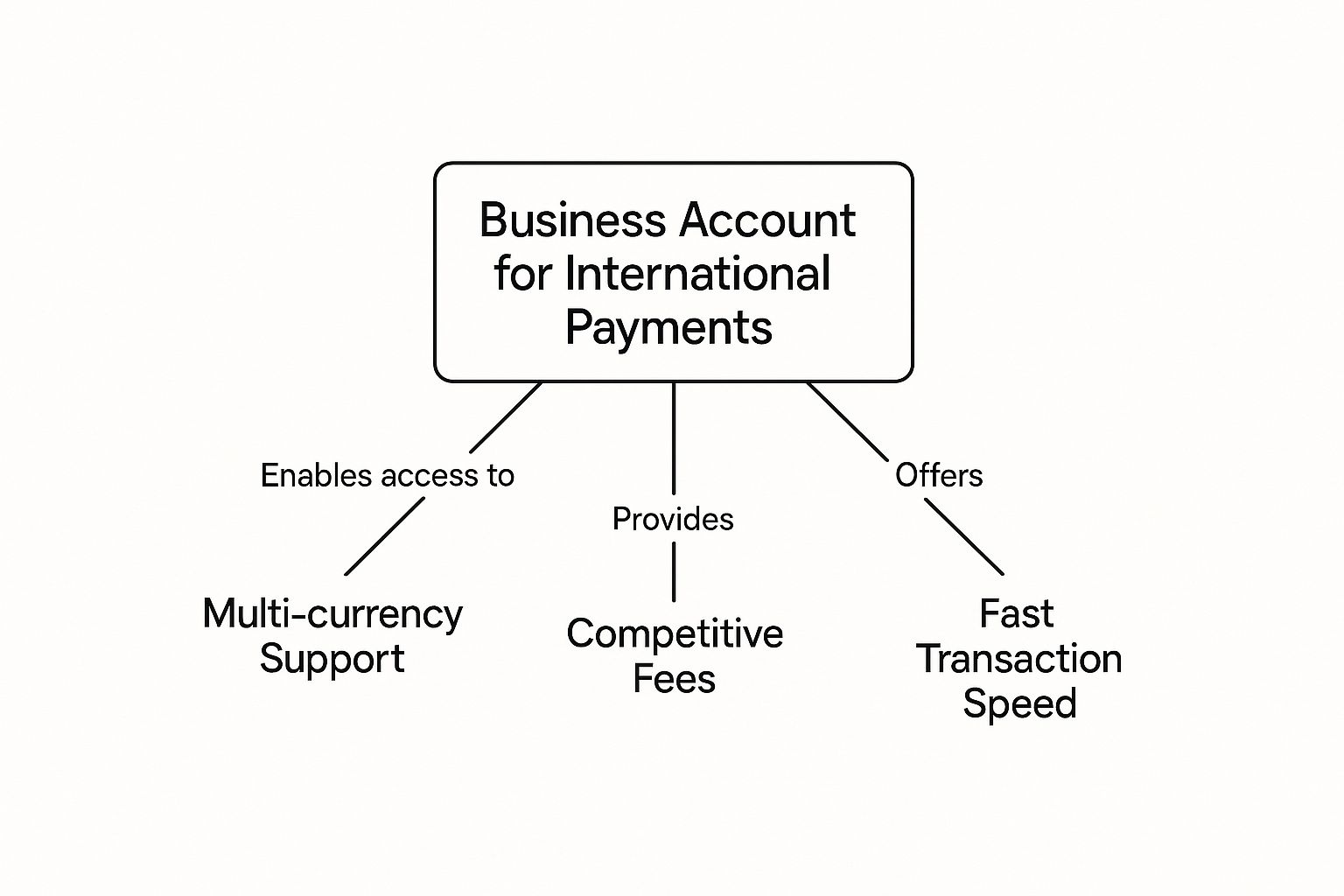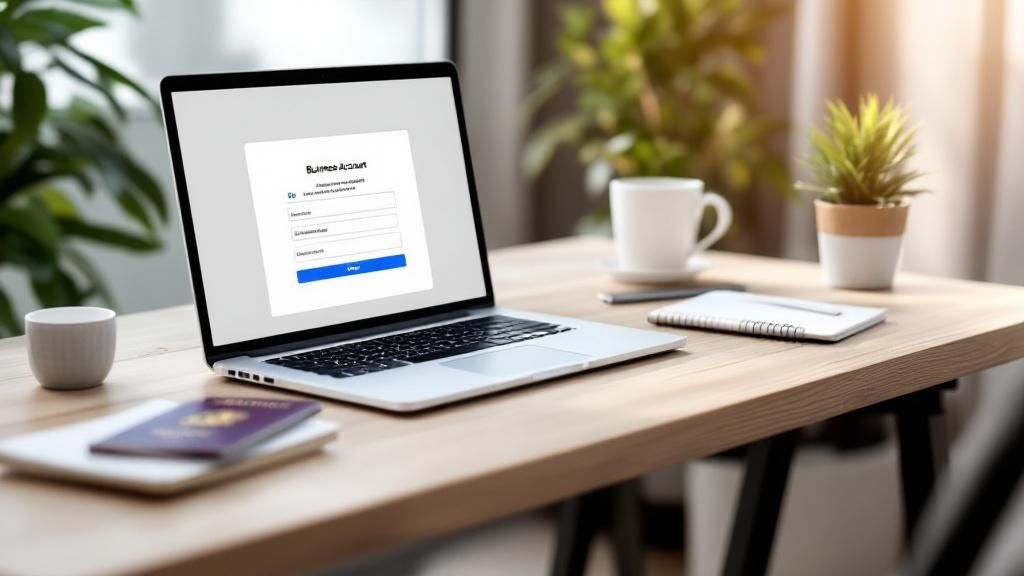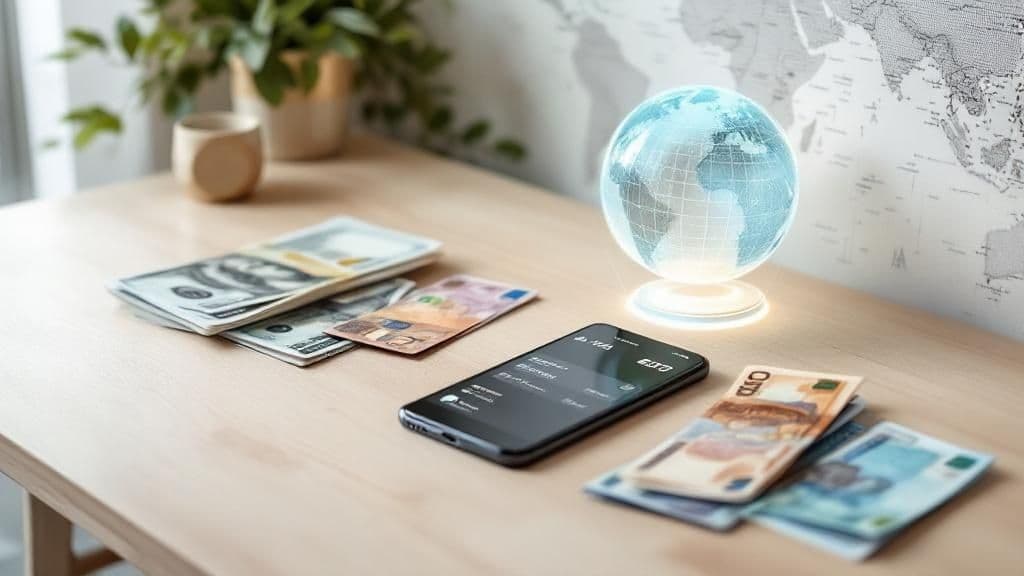At its core, a business account for international payments is a financial account built specifically for companies that send and receive money across borders. Think of it as a financial passport for your business, designed to handle multiple currencies and sidestep the steep fees and frustrating delays that often come with traditional banking.
What Is a Business Account for International Payments?
Imagine trying to pay a supplier in the United States using your standard South African business account. The process can feel a bit like sending a parcel overseas with the regular post. It will probably get there, but you can expect high costs, confusing tracking, and potential hold-ups at every step. A domestic account just isn't equipped for the nuances of global trade.
An international business account, on the other hand, is the express courier of the financial world. It's engineered from the ground up to handle these complexities. Foreign transactions aren't an afterthought; they are the main event, giving your money a direct, faster, and more affordable route to its destination.
This infographic neatly illustrates the core elements that make these accounts so powerful for a growing business.

As you can see, the real value lies in how these accounts combine multi-currency support with better exchange rates and quicker transaction times.
To really grasp the difference, it helps to see a direct comparison. Here’s a quick look at how a specialised international account stacks up against a standard local one.
Table: Traditional vs. International Business Accounts at a Glance
| Feature | Standard Business Account | International Business Account |
|---|---|---|
| Primary Use | Domestic (within ZA) payments and banking. | Sending and receiving money globally. |
| Currency Handling | Primarily ZAR. Foreign currencies are converted at high mark-ups. | Holds and transacts in multiple currencies (e.g., USD, EUR, GBP). |
| Transaction Fees | High intermediary and receiving bank fees on SWIFT payments. | Low, transparent fees. Often no intermediary bank costs. |
| Exchange Rates | Poor rates with significant hidden margins. | Competitive rates, often close to the mid-market rate. |
| Payment Speed | Slow, typically 3-7 business days for international wires. | Fast, often within 1-2 business days or even same-day. |
| Recipient Experience | Recipient may receive less than expected due to hidden fees. | Recipient gets the full amount, or close to it. |
This table makes it clear: using the wrong account for global trade is like trying to use a city car for a cross-country safari. It’s just not the right tool for the job.
The Key Advantages for Your Business
By its very nature, an international payment account is designed to solve the biggest headaches of doing business globally. It helps protect your profit margins and makes your operations run much more smoothly.
Here’s what you stand to gain:
- Significant Cost Savings: These accounts typically avoid the costly correspondent banking system, which means fewer hidden fees. You also get far better exchange rates, ensuring more of your money actually makes it to your recipient.
- Faster Payments: Forget waiting the typical 5-7 days for a wire transfer to clear. Payments can land in a matter of hours or within a couple of business days, which does wonders for your relationships with suppliers and freelancers.
- Simplified Admin: The ability to hold balances in currencies like USD, EUR, or GBP is a game-changer. You can pay and get paid just like a local business in those regions, which eliminates costly forced currency conversions and makes bookkeeping a breeze.
Ultimately, a dedicated business account for international payments is more than just a place to park your money; it’s a strategic asset. It removes financial friction, empowering your business to operate globally and compete on a level playing field.
Why Your Growing Business Needs a Global Account

When your local business starts hitting its stride, the world suddenly feels a lot smaller. Before you know it, you're working with suppliers in Asia, landing clients in Europe, and hiring freelancers from North America. But this exciting growth often comes with a whole new set of financial headaches, especially when you’re trying to manage global commerce with a bank account built for local business.
Let’s paint a picture. You need to pay an invoice for a key supplier in Germany. You log into your standard bank, send the money, and assume all is well. But then the problems start. The exchange rate you got was terrible, hidden fees from intermediary banks have shaved off a chunk of the payment, and the money arrives late. Your supplier is unhappy, your profit margin just took a hit, and a crucial relationship is now on shaky ground. This isn't just a bad day; it's what happens all the time when you're using the wrong tools for the job.
This is exactly why a dedicated business account for international payments stops being a nice-to-have and becomes an absolute necessity.
Protect Your Profits and Your Reputation
Every time you send or receive money across borders, you're exposed to risk. Currency values can swing wildly, and banking systems can cause frustrating delays. A proper global account is engineered from the ground up to shield you from these problems. Instead of being stuck with your bank's daily exchange rate—which almost always includes a hefty markup for their trouble—a specialised provider can give you access to far more competitive, near-market rates.
The impact on your bottom line is immediate. Saving even a small percentage on every single transaction quickly adds up, freeing up significant capital you can put right back into growing your business.
Think of it this way: a dedicated international account takes global payments from being a source of constant friction and unpredictable costs to being a smooth, cost-effective part of your operation that actually helps you expand.
Beyond the numbers, getting your partners and suppliers paid the right amount, on time, is foundational to building a solid international reputation. A reliable payment process shows that you're professional, stable, and a partner worth trusting on the global stage.
Gain a Competitive Edge
Operating internationally means you're not just competing with the business down the road anymore; you're up against companies from all over the world. A major advantage in this arena is operational efficiency. While your competitors are stuck wrestling with slow bank transfers and confusing fee structures, you can be nimble and quick on your feet.
The South African economy is deeply intertwined with global trade. To give you an idea of the scale, in a recent year, the country's merchandise exports were around R1.895 trillion, with service receipts adding another R292 billion. These massive flows directly affect currency availability and transaction costs, making efficient payment processing critical for any South African business with global ambitions. You can dig deeper into these economic drivers in this South African Reserve Bank report.
By moving to a modern business account for international payments, you’re doing more than just cutting costs—you're building a more resilient and competitive operation. It's a strategic move that lets you act faster, forge stronger relationships, and grow your business with confidence.
What to Look For in a Top International Account
 When you start comparing options for a business account for international payments, it’s easy to drown in marketing buzzwords. To cut through the noise, you need to know what actually matters. The best accounts aren't just for sending money; they're complete platforms built to make your global operations smoother and more profitable.
When you start comparing options for a business account for international payments, it’s easy to drown in marketing buzzwords. To cut through the noise, you need to know what actually matters. The best accounts aren't just for sending money; they're complete platforms built to make your global operations smoother and more profitable.
Focusing on the right features helps you move beyond a simple transaction tool and find a true financial partner. Let's break down the non-negotiables you should be looking for and why they're so critical for your success.
Multi-Currency Wallets and Balances
This is the big one. A top-tier international account lets you hold, send, and receive money in currencies like USD, EUR, and GBP without having to convert them back to Rand straight away. It’s like having local bank accounts in all the countries you work with, but you manage them all from a single dashboard.
Why is this a game-changer? Picture this: you receive $10,000 from a client in the US. With a standard bank account, that money gets automatically converted into ZAR, usually at a pretty average rate. If you then have to pay a $5,000 invoice to a US supplier a week later, you’re forced to convert your ZAR back to USD, getting hit with another poor exchange rate. You lose money twice on the same funds.
Holding a USD balance shields your business from this double conversion and protects you from Rand volatility. You can receive dollars and use those same dollars to pay your international suppliers, completely bypassing unnecessary currency exchange and preserving your cash.
Competitive and Transparent Foreign Exchange Rates
The foreign exchange (FX) rate is where traditional banks often hide their costs. They usually quote a "retail" rate, which can be 2-5% worse than the real mid-market rate you see on the news. That might not sound like a lot, but on large or frequent transactions, it quickly adds up to thousands of Rands lost.
A superior business account for international payments will give you FX rates that hug the real-time mid-market rate. Look for providers who are upfront about their pricing. Some, like Zaro, even offer the real spot rate with zero spread, which means you get the true value of your money. This kind of transparency is the only way to accurately forecast your costs and protect your profit margins.
Key Operational Features to Scrutinise
Beyond currencies and rates, a few operational features separate an adequate account from a great one. These are the details that affect your daily efficiency and financial control.
- Low and Transparent Transfer Fees: Don't get caught out by complicated fee structures. The best platforms charge very little—or nothing at all—for sending and receiving international payments. They skip the usual SWIFT and intermediary bank fees that can mysteriously shrink the amount your recipient gets.
- Seamless Accounting Software Integration: Your payment platform shouldn't be an island. Look for accounts that connect directly with popular accounting software like Xero or Sage. This integration automates the tedious job of reconciliation, cuts down on manual data entry, and gives you a live, accurate picture of your company's finances.
- Enterprise-Grade Security and Controls: This is non-negotiable. Your financial platform must be secure. Make sure it has essentials like two-factor authentication (2FA), data encryption, and solid team management tools. The ability to set specific permissions and approval workflows gives you complete control over who can initiate and authorise payments.
By making these features your priority, you can confidently pick an account that does more than just move money—it actively helps your business grow globally.
How to Choose the Right International Payment Provider
Picking a provider for your business account for international payments can feel overwhelming, but it doesn't have to be. If you break it down and know what to look for, the process becomes much clearer. The right partner isn't just a money mover; they become a crucial part of your global operations. To make a smart choice, you have to look past the flashy marketing and get down to what really impacts your business's efficiency and bottom line.
Look Beyond the Advertised Fees
The first thing most people look at is the fees, and for good reason. But a provider shouting about "low fees" might be hiding something. Often, the real cost is buried in a less-than-favourable exchange rate.
You need to demand total clarity on two fronts: the upfront transfer fee and the foreign exchange (FX) spread. The best partners will offer rates very close to the mid-market rate you see on Google, coupled with a simple fee structure that’s easy to understand. No hidden surprises, just straightforward costs.
Speed and Reliability are Non-Negotiable
Once you've got a handle on the costs, think about speed. In the world of international business, time really is money. Slow payments can strain relationships with suppliers and throw a spanner in your supply chain.
Ask potential providers about their average transfer times for the countries you deal with most. Finding a service that can consistently get your funds where they need to be within 1-2 business days is a massive advantage. It keeps things moving smoothly.
Evaluating Stability and Support
This is where you separate the good from the great. You're trusting a company with your money, so their stability and the support they offer are just as critical as fees and speed.
A provider’s access to foreign exchange reserves is a strong sign of their stability. A country's reserves directly affect how financial institutions can even offer international payment services. For example, South Africa's foreign exchange reserves, recently sitting around $47.9 billion USD, play a big role in stabilising the Rand. These reserves ensure there’s enough liquidity in major currencies like the USD or EUR for businesses to make payments. You can explore more data on how these reserves work on ceicdata.com.
Providers with solid connections to these deep liquidity pools are far less likely to run into problems, giving you a much more reliable service.
The key takeaway is this: a provider's stability is directly tied to its access to foreign currency. Healthy national reserves mean less risk and more confidence for businesses like yours.
Finally, never underestimate the value of good, old-fashioned customer support. When a payment goes sideways or you have an urgent question, you need to talk to a knowledgeable human being, not fight with a chatbot. Test their support channels before you commit. A responsive, helpful team is often the best sign that a company genuinely cares about its clients and is ready to be a true partner for your global growth.
By carefully working through these areas—fees, speed, stability, and support—you can confidently narrow down your options. The goal is to find a provider that truly fits your business and helps you expand internationally, without the headaches.
A Better Way to Handle Global Payments in Today's Business World

If you've ever dealt with the headaches of traditional banking, you know firsthand that global businesses need a smarter way to move money. The old world of slow wire transfers and frankly terrible exchange rates just wasn't designed for the pace of modern commerce. Thankfully, a new generation of fintech platforms, built specifically for cross-border trade, has arrived to offer a far more effective alternative.
Think about the last time you had to pay a supplier in Europe. With a standard bank, it probably kicked off a slow and surprisingly expensive chain of events. But when you use a business account for international payments, that whole experience is turned on its head. What was once a costly, time-consuming chore becomes a straightforward and transparent task you can complete in minutes.
These platforms aren't just a digitised version of your old bank account. They're more like a financial control centre, built from the ground up to solve the real-world problems that come with international trade. They give you the ability to open foreign currency accounts instantly, access competitive FX rates, and simplify the entire payment process, getting rid of the friction that slows businesses down.
Paying a Supplier: The Modern Approach
Let's walk through a real-world example to see just how different it is. Imagine you need to settle a €5,000 invoice with a partner in Germany.
- Fund Your Account: First, you simply fund your local ZAR account with a standard electronic transfer. No special trips or paperwork needed.
- Convert at a Fair Rate: Inside the platform, you convert the exact amount you need into Euros. With a provider like Zaro, you're getting the real spot exchange rate, without the hidden markups. You see precisely what you'll get before you commit.
- Pay Like a Local: Finally, you send the €5,000 directly from your newly created Euro balance. Because it's treated like a local transfer, the payment arrives quickly and in full, with no surprise deductions from intermediary banks along the way.
This entire process is not only faster but also significantly cheaper, giving you complete visibility and control. You sidestep the typical 3-5% currency conversion markups that banks often apply, saving your business a substantial amount on every single transaction.
The real power here is the shift in control. You go from being a passive customer who accepts whatever rate the bank gives you, to an active manager of your company's foreign exchange. You get to decide when to convert your currency and can send payments instantly, all from a single dashboard.
Meeting the Demands of a Global Market
This move toward digital-first solutions isn't happening in a vacuum; it’s a direct response to a clear market need. The South African financial scene has shown a growing appetite for instant, electronic payment options to support the boom in international trade. As local businesses expand their reach, they need financial tools that can actually keep up.
This has fuelled the rise of specialised financial providers that focus on making cross-border transactions smoother, faster, and more transparent. For a deeper look into these trends, you can explore more on South Africa's evolving payments landscape on globenewswire.com.
At the end of the day, a modern business account for international payments is much more than just a way to send money. It’s a strategic asset that gives South African businesses the financial agility they need to compete—and win—on a global scale.
Frequently Asked Questions
Diving into the world of global finance can feel a bit overwhelming, and it's natural to have questions. We get it. This section is designed to give you straightforward, practical answers to the things business owners ask us most often about business accounts for international payments. Let's clear up any confusion around costs, setup times, and security.
Is a Specialised Business Account for International Payments Expensive?
This is probably the number one question we hear, and for good reason. For years, traditional banks have made international transactions feel complicated and costly, often tacking on setup fees, monthly charges, and surprisingly high percentages for every transfer.
Thankfully, that model is becoming a thing of the past. Modern financial technology providers have flipped the script. Many of the best international business accounts today have no monthly fees at all. Their business model is based on a small, transparent margin on the foreign exchange rate—a rate that is almost always much better than what you’d get from a bank.
The reality is, a dedicated international account is nearly always more cost-effective than using your standard domestic bank account. By sidestepping hidden markups and unnecessary transfer fees, you save real money on every single payment you send or receive.
How Long Does It Take to Set Up an International Business Account?
If you're picturing weeks of paperwork and multiple trips to the bank, you're in for a pleasant surprise. Setting up an account with a digital provider is remarkably quick. The entire process happens online, from start to finish.
You’ll still need to provide standard business documents, like your company registration details and director IDs. This is all part of the standard Know Your Business (KYB) compliance check that any regulated financial institution must perform. It’s a non-negotiable step to keep things secure.
In most cases, you can have a fully verified and operational account within just a few business days. This means your business can start tapping into global opportunities right away, without the frustrating delays.
Are Digital International Payment Platforms Safe?
Yes, absolutely. For any reputable provider, security is the top priority. These are regulated financial institutions, meaning they have to play by the same strict security and compliance rules as any high-street bank.
When you're choosing a platform, you want to see a commitment to protecting your funds and data. Here are a few non-negotiable security features to look for:
- Two-Factor Authentication (2FA): An essential extra step in the login process that keeps unauthorised users out of your account.
- Data Encryption: This ensures all your sensitive financial and business information is scrambled and unreadable, both when it's being sent and when it's stored.
- Segregation of Client Funds: This one is crucial. It means your money is held in a separate, safeguarded account, completely ring-fenced from the company’s own operating funds.
With these measures in place, you can be confident your money is protected by the same high standards you’d expect from any major financial player.
Can I Hold Multiple Currencies in a Single Account?
Yes, and this is where these accounts truly shine. It’s one of the most powerful features of a modern business account for international payments. The ability to open multi-currency wallets within a single account is a game-changer.
This means you can get paid in Euros, US Dollars, or British Pounds and simply hold those funds in their original currency. You aren't forced into an immediate, and often poorly timed, conversion back to Rand.
Think about it: you can receive a payment of $10,000 USD from an American client and just let it sit in your USD wallet. When it's time to pay a supplier in the US, you can use that exact balance. This simple workflow lets you completely sidestep unnecessary currency conversions, giving you far more control over your cash flow and protecting your profits from volatile exchange rates.
Ready to stop overpaying for international payments and take control of your global finances? Zaro offers South African businesses access to real exchange rates, fast transfers, and a secure platform built for growth.
Open your free Zaro account today and experience a smarter way to pay the world.
